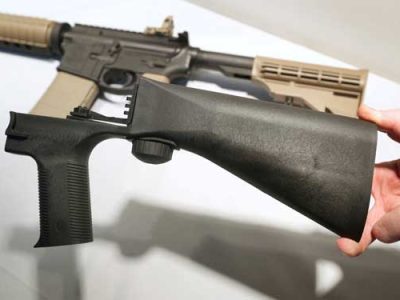In March 2019, the United States Supreme Court twice refused to block President Donald Trump’s bump stock reclassification.
This move came in the wake of the 2017 Las Vegas mass shooting. The evildoer responsible allegedly used a bump stock, which basically makes it easier to fire a semi-automatic rifle. The Gun Owners of America and two other such groups asked a federal judge to block this order while courts determined whether or not it was constitutional. Lower courts refused to grant an injunction, and the Supreme Court upheld these decisions without comment.
GOA Legislative Counsel Michael Hammond said his group “will continue to fight the issue in the court system, as the case now returns to the lower courts. We remain convinced that the courts will consign this unlawful, unconstitutional ban to the trash bin of history, where it belongs.”
What Just Happened?
Many media outlets implied, or outright stated, that the Supreme Court “upheld” the bump stock ban. But the Justices did nothing of the kind. In fact, they did not even consider the ban. They just looked at GOA’s request for a temporary restraining order. Judges occasionally issue these orders in civil cases, but they are difficult to obtain. And, they have very little to do with the merits of the case.
So, GOA faced an uphill battle from the beginning. TRO elements vary slightly in different jurisdictions, but typically, requesting parties must show all of the following:
- Likelihood of Success on the Merits: Essentially, the plaintiff must have a prima facie claim for relief. It must have all the elements necessary. The “likelihood” need not be more than a 50-50 shot. Based on the regulatory principles outlined below, GOA probably met this part of the test.
- Public Interest Favors the Plaintiff: Now, things start going downhill. Gun owners clearly have a right to own firearms attachments, like silencers and bump stocks. But the government clearly has a right to prevent incidents like the Las Vegas shooting. One interest is clearly not more compelling than the other one, especially at this preliminary stage.
- Irreparable Harm: When the Supremes reached this element, the bump stock TRO claim pretty much went off the rails. Gun owners may not like surrendering their bump stocks, but they will not suffer “irreparable harm” because of this rule.
Pre-foreclosure TROs are a good local illustration. Many distressed homeowners facing foreclosure file TRO applications in Georgia state courts because they do not want to lose their homes and do not want to file bankruptcy. Additionally, since the Peachtree State is a non-judicial foreclosure state, a TRO is basically the only way for homeowners to get their day in court.
These homeowners can clearly show irreparable harm, and the family’s interest in keeping the home is higher than the bank’s interest in making a buck. But unless there are serious issues with the mortgage, such as allegations of fraud, most Georgia judges will not grant these orders.
A final note is that the bump stock ban is just a federal agency regulation. President Trump created the rule with the stroke of a pen, and he or any future president could undo it the same way.
What Happens Next?
Now, the bump stock ban dispute goes back to the district court from whence it came. There, government lawyers must establish that the ban is constitutional. The law just changed on this point and it is a bit unsettled. But generally, if the rule substantially affects Second Amendment rights, which the bump stock ban probably does, courts must apply the strict scrutiny test. There are two elements:
- Compelling Government Interest: Again, most judges would say that gun control in the wake of a mass shooting is a compelling governmental interest. But in this case, the Supreme Court’s decision may be a blessing in disguise, because it delayed the proceedings. By the time a district court gets serious about the bump stock ban, the Las Vegas shooting will only be a distant memory.
- Narrowly Tailored: Here, the bump stock reclassification is in trouble. The Trump Administration basically lumped bump stocks in the same category with machine guns, which are clearly banned under federal law. But bump stocks have a legitimate purpose. They help people with limited use of their hands to hold and fire semi-automatic rifles. Before the federal reclassification, bump stocks were legal in over forty states. It would make more sense to classify bump stocks alongside silencers and other firearms attachments that are legal under the National Firearms Act.
Alternatively, the district court may apply the intermediate scrutiny test, which is a slightly lower standard. If the court applies the wrong test, that could be grounds for a separate appeal. So, this question may be tied up in the courts for a while.
What a Gun Trust Cannot Do
Currently, if you have a bump stock, you probably cannot place it into an NFA gun trust. It’s only legal to own machine guns, and machine gun parts, that were manufactured prior to 1986. You might be able to disable it and keep it until the courts determine the legality of the ban. But it’s probably a better idea to get rid of it.
On a similar note, gun trusts cannot expand firearm ownership rights. If federal or state law forbids gun ownership, perhaps due to a criminal record or immigration status, a gun trust cannot change that reality.
Finally, as of 2016, gun trusts are subject to Rule 41F. This rule requires people who buy guns at trade shows to undergo background checks.
What a Gun Trust Can Do
This section will be much longer than the previous one, because there are a lot of good reasons to partner with a Marietta gun rights attorney and set up a trust. In as little as one or two office visits, an attorney can forge a trust which:
- Prevents Unintentional Crimes: A gun can only have one owner. If you accidentally leave it in the trunk of your wife’s car, she could be prosecuted for unlawfully carrying a weapon. But if she is a member of a gun trust, that cannot happen.
- Saves Money: Gun transfer fees are usually hundreds of dollars. If you have a firearm collection, that could be an awful lot of money. NFA gun trusts completely bypass this requirement.
- Protects Privacy: When gun owners die, their gun collections become part of the public probate court record. That could be embarrassing at best and dangerous at worst. Evildoers could break into your house to steal your guns. Trusts are private.
- Passes on Your Values: There’s more to owning a gun than pulling a trigger. Most gun trusts include ownership requirements like completing a training course or otherwise demonstrating ownership responsibility.
Honorable mention goes to ease of ownership transfer, incentive trust planning, and provisions for your temporary disability.
Protect Your Second Amendment Rights
The bump stock bruhaha illustrates why you need a gun trust. For a confidential gun trust consultation with an experienced Second Amendment attorney in Marietta, contact NFA Lawyers, LLC. Convenient payment plans are available.



 What NFA Firearms Can I Own in and Around Georgia?
What NFA Firearms Can I Own in and Around Georgia?